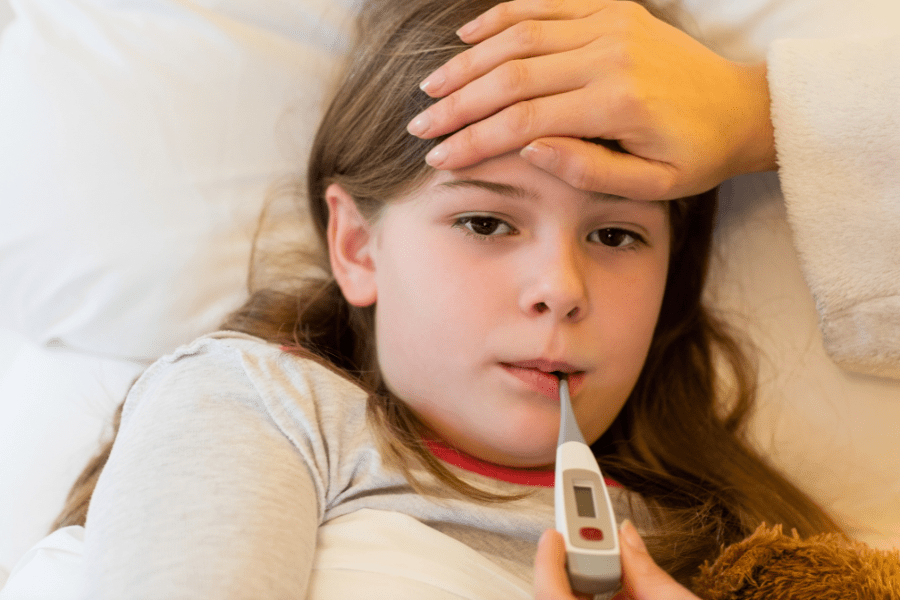Febrile Seizures
Overview

A febrile seizure is a convulsion in a child that's caused by a fever. Simple febrile seizures are usually benign, but children with complex febrile seizures are at risk for future epilepsy.
The fever is often from an infection. Febrile seizures occur in young, healthy children who have normal development and have not had any neurological symptoms previously.
It can be very scary when the child has a febrile seizure. But luckily, febrile seizures are harmless. They only last a few minutes, and typically indicate any serious health issues.
So, during a febrile seizure, help the child by keeping them safe by offering comfort. Call the healthcare provider to have your child evaluated as soon as possible as soon as the febrile seizure sets in.
Symptoms
The symptoms may be as follows-
• A child having a febrile seizure shivers all over and loses consciousness. At times, the child may get very stiff or twitch in just one area of the body.
• A child having a febrile seizure may:
-Lose consciousness
-Have a fever higher than 100.4 F
-Shivers or jerks the arms and legs
• Febrile seizures are classified as simple or multiple
-Simple febrile seizures are the most common type that lasts from a few seconds to 15 minutes. Simple febrile seizures do not recur within 24 hours and are not specific to one part of the body.
-Multiple febrile seizures. This type lasts longer than 15 minutes and occurs more than once within 24 hours.
Causes & Risks
• Seizures in general may happen during a cold, flu, or ear infection. Sometimes the child may not have a fever at the time of the seizure but will develop one a few hours later.
• Normally, a higher-than-normal body temperature causes febrile seizures, and even a low-grade fever can trigger a febrile seizure.
• The fevers that trigger febrile seizures are mostly caused by a viral infection, and less commonly by a bacterial infection. The influenza virus and the virus that causes roseola, which often are accompanied by high fevers, appear to be most frequently associated with febrile seizures.
• The risk of febrile seizures may increase after some childhood vaccinations, and these may include the diphtheria, tetanus, and pertussis vaccines and the measles-mumps-rubella vaccine. A child can develop a low-grade fever after a vaccination. Here the fever causes the seizure.
• Factors that may increase the risk of a febrile seizure-
-Childhood -Most febrile seizures occur in children between 6 months and 5 years of age, with the greatest risk being between 12 and 18 months of life.
-Family history - Some children carry a family's tendency to have seizures with a fever.
Test & Diagnosis
• To diagnose the cause of a complex febrile seizure, the healthcare professional will recommend an electroencephalogram, (a test that measures brain activity). Your doctor may also recommend Magnetic resonance imaging, to check the child's brain activity.
• The doctor will carefully review the child's medical and developmental history to exclude other risk factors for epilepsy. In normally developing children, identifying the cause of the child's fever is the first step after a febrile seizure.
• Children with up-to-date vaccinations don't need testing. The doctor can diagnose the febrile seizure based on history.
• The doctor may recommend tests to check for infections such as a blood test, urine test, and a spinal tap, to see if the child has a central nervous system infection.
Treatment
The treatment for Febrile seizures-
• Simple febrile seizures are spontaneously resolved by the time the child is evaluated and may not need to be treated at all, whereas a prolonged seizure may require abortive treatment.
• Most febrile seizures stop on their own within a couple of minutes.
• If your child has a febrile seizure, stay calm and follow these below tips:
-Place your child on his or her side on a soft, flat surface where he or she won't fall.
-Start timing the seizure.
-Stay close to watch and comfort your child.
-Remove hard or sharp objects near your child.
-Loosen tight or restrictive clothing.
-Don't restrain your child or interfere with your child's movements.
-Don't put anything in your child's mouth.
• Giving the child fluids such as water or juice will also help cool them. Giving them the recommended amount of paracetamol or ibuprofen syrup will help to calm them down.
Living With
Febrile seizures may be very upsetting to watch but they are not at all harmful to the child. Even very long seizures lasting an hour or more, rarely cause harm.
Febrile seizures do not cause brain damage, and there is no increased risk of epilepsy in children who have had simple febrile seizures.
Tips-
-If the child is sitting or standing, slowly move them to the floor.
-Try not to hold or restrain the child with the seizure.
-Do not place anything in the child's mouth.
-Do not give the child any fever-reducing medication
-Do not put the child into cool or lukewarm water to cool off.
Complications
• Febrile seizures rarely produce lasting effects and do not cause any brain damage, intellectual disability, or learning disabilities. They don't mean your child has a more serious underlying disorder.
• Febrile seizures are provoked seizures and do not indicate epilepsy. Epilepsy is a condition characterized by recurrent unprovoked seizures caused by abnormal electrical signals in the brain.
• Recurrent febrile seizures - The most common complication is the possibility of more febrile seizures.
Recurrence can be higher if –
The child's first seizure resulted from a mild fever.
The febrile seizure was the first sign of illness
A family member has a history of febrile seizures.
The child is younger than 18 months at the time of the first febrile seizure.





